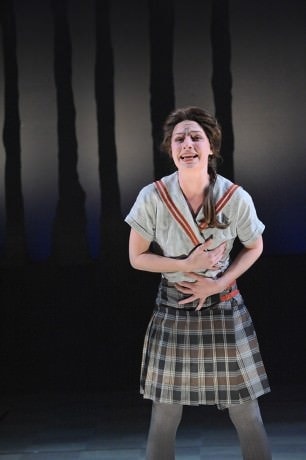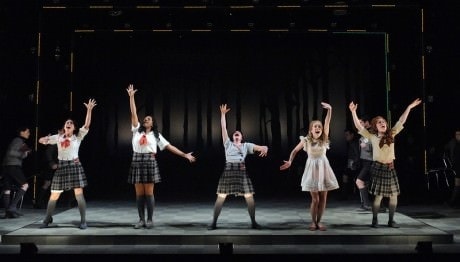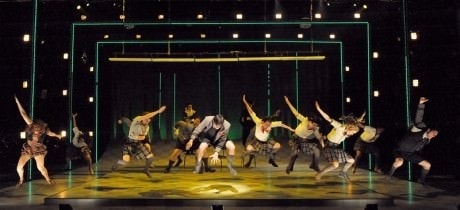Here’s Part 3 of our Behind the Scenes look at Olney Theatre Center’s Spring Awakening. We continue our interviews with the cast with Gracie Jones.
Joel: Why did you want to be part of this production of Spring Awakening at Olney Theatre Center?

Gracie: I originally wanted to audition for this production because I’ve greatly enjoyed working Chris Youstra in the past and I was eager for a chance to work with him again. I had actually seen the show done by other theatres and had come to the conclusion that the subject matter was not exactly my cup of tea, but that I was somehow intrigued by the content as well. I then began developing a strong desire to explore this piece first hand and was fortunate enough to be given the opportunity to do so!
Have you appeared in any other productions of Spring Awakening?
I have not performed in any other production of this show! This is my first!
Introduce us to the character you play and tell us why you wanted to play this role. How did you prepare for your role? What personal experiences did you bring to your performance?
Thea is one of the schoolgirls, friends with Martha, Anna, and Wendla. I was excited to play the role because she seemed to be somewhat spunky! She then began to take on a subtle dark side as rehearsals progressed. Preparation for this role requires an awareness of my body more than anything else. I have to make sure the adjustments my body makes to accommodate the character are deliberate and controlled. My own background, having grown up a country girl, certainly helps when it comes to adopting the nuances of a child running and jumping through the woods! As far as personal experience emotionally is concerned, I kind of let Thea take the reins and leave Gracie out of it, having been fortunate enough to grow up in a home where many of the issues these girls are struggling with were not prevalent. I prefer to let the character’s untold personal experiences influence me rather than drawing from my own most of the time.
How do you relate to your character? What do you admire most about your character?
I relate to Thea in that I can understand her personal struggle, the struggle of many children, to make sense of violence. Sometimes it can feel easier to justify it away in order to avoid the reality of a situation. I can admire her tenacity, though. Where the opinions she voices and her demeanor may seem a bit perverse and cold at times, she is working to display the compassion that seems to come more easily to many of her friends. For some people, empathy can be a struggle to evoke in oneself and maintain without being overwhelmed!
How has Steve Cosson helped you to shape your performance? What advice and suggestions did he give you that helped you with your performance?
Steve helped to mold my performance in a pivotal way. Because of him, some of Thea’s quarks and personality were brought to life simply in the way he blocked our scenes. He has a gift of not only blocking characters so that the scenes are visually pleasing and authentic to the audience, but they bring out the core of who these characters are from the inside out. I especially appreciated Steve’s willingness to use his body to demonstrate how the character may feel about a given circumstance without reciting the specific lines written in the script. This subtle reminder of one’s subtext was very helpful to me when it came to fine tuning my performance.

Talk about your ‘big number.’ What is happening in the story to your character when the song is being sung and what is your character thinking as he/she is singing the song? What does the song mean to you?
The girls’ big number all together is “My Junk,” in which we are all daydreaming about the guys we have crushes on! For Thea, I think she’s given the opportunity in this song to release a little bit of that spunky, slightly obsessive and frantic personality. I think Thea is merely acknowledging how exciting if is to think and feel however you want to about a boy, yet enjoy the lack of emotional consequences that come with it all being in your head! This song, to me, represents the fun there is in discovering what it is to have a crush on someone and revel in the bittersweet lack of direct contact with that person!
What scene (s) that you are not in do you enjoy watching? And what is your favorite song that someone else sings and why?
I watch every scene I am not in! I find them all to be so captivating and I honestly don’t think I could choose one song to be my favorite! I love the boys’ number “All That’s Known” and “Bitch of Living” but every one of Moritz’s numbers moves me very deeply as well. Similarly, “Dark I Know Well” always gives me goosebumps because of the chilling content and the way the lighting and choreography perfectly brings the characters inner thoughts and emotions to life. I just can’t take my eyes off the stage from the wings!
What it about the show’s design that thrills you when you perform the show?
I can honestly say there is not one part of this show’s design that does not touch me. The set design perfectly merges the present day with the many generations that came before our resin chairs and fluorescent lighting. The silhouetted trees are wild and yet the crisp lighting gives them a modern flair, as do the portals covered in LED lights that seem to mimic the emotions and brainwaves of the characters as they sing! The ramp upstage is always thrilling to use as an actor, and the sound is so beautifully mixed between the vocals and the orchestra, its chilling every time we get to listen to all the haunting sounds of the strings and percussion!
Have you worked with any of your fellow actors before and what do you admire the most about their performances in this production?
I have worked with a handful of them before! I admire all of their abilities to become their characters so thoroughly and then five minutes after leaving the stage, be back to themselves. That can be difficult with subject matters like this, and yet everyone’s performances are always beautifully healthy. The vast range of vocal textures in this cast is also inspiring. Everyone’s voices are so unique, and yet blend very well. Similarly, I’m constantly in awe of what my castmates can do with their bodies when it comes to the awesome choreography. Some of their leaps and jumps seem to defy gravity and bring their characters to life.
What does Spring Awakening have to say to 2013 audiences?
I think it asks audiences to think about what difficulties are present in many family units regardless of the generation or era. The issues addressed are set in a time period that seems very long ago and far away, but I think this production asks viewers to assess how these matters may still be prevalent today. I think it also asks viewers to take note of the inner fears and curiosities of a child by presenting them in the forms of song and movement, light, space, and sound. These elements together create an abstract canvas displaying what is happening emotionally for these kids and urging an audience member to remember how that felt themselves.

What advice would you give to a high school student who is about to play Thea in their high school production of Spring Awakening?
I would say don’t be afraid to explore any possible alternatives as to why she says certain things or is blocked a certain way. Don’t be afraid to read her lines differently, think outside of the box and outside your own comfort zone. Sometimes it’s more interesting if the character is not as much like you as you’d assumed she would be and to discover why that may be as well.
If you had a chance to write a happy ending for the show, what would happen to your character?
I think Thea would hopefully find the resolve to actively seek the better world the characters in this show so often refer to. I think that’s the hope for all the children in this show. The wonderful happy ending would be the acknowledgement that there’s a lot of work to do, but attaining change is possible and it has to start inside you and work its way outward though cooperation communication and patience.
What are you doing next on the stage after this show?
I have not yet figured that out, to be honest! I’m in the process of auditioning for potential upcoming shows in the area, but I have a few months of downtime to concentrate on my beautiful family in a trip cross country before my next on-stage adventure!
Spring Awakening plays through March 10, 2013 at Olney Theatre Center’s Main Stage — 2001 Olney-Sandy Spring Road, in Olney, MD. For tickets call (301) 924-3400, or purchase them online. Running Time: Approximately two hours with one intermission.
LINKS:
Part 1: ‘Whisperings’: Behind the Scenes at Olney Theatre Center’s ‘Spring Awakening’: Director Steve Cosson.
Part 2: ‘Whisperings’: Behind the Scenes at Olney Theatre Center’s ‘Spring Awakening’: Matthew Kacergis.
Part 3: ‘Whisperings’: Behind the Scenes at Olney Theatre Center’s ‘Spring Awakening’: MaryLee Adams.
Amanda Gunther’s review of Spring Awakening on DCMetroTheaterArts.





